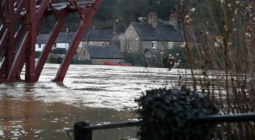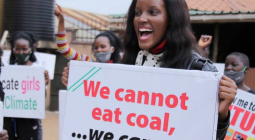Nine Climate Change Cases You've Never Heard Of
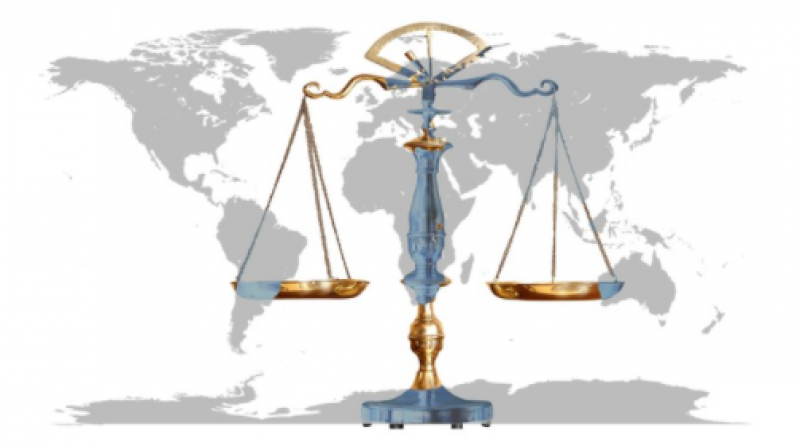
Climate change poses unprecedented challenges. Rising global temperatures are causing more frequent severe weather events, including wildfires and floods, capable of massive disruption that sweeps away homes and takes lives.
While campaigners have taken to the streets advocating for companies and governments to address climate change, lawyers are setting new legal precedent on climate cases.
They argue that the effects of climate change are eroding fundamental human rights and freedoms. Adequate food and water, livelihoods, housing and human life are at stake.
No silver bullet
Although there is “no silver litigation bullet for climate change”, as Michael Gerrard, director of the Sabin Center for Climate Change Law at Columbia University in New York puts it, these cases show that the strike of a gavel can keep planes on the ground, stop deforestation, and lower CO2 emissions.
Rsh attempts—some more successful than others—to further the climate agenda in courtrooms around the world. This issue of our newsletter highlights examples of litigation in this area.
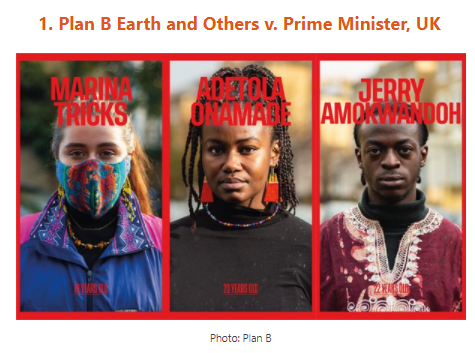
Status: Pending
Filed: May 2021
Plaintiffs: Plan B Earth, Onamade, Amokwandoh, Tricks, and Crosland
Defendant: UK government
Petitioners including three youths and the Plan B Earth group of advocates alleged that despite committing to net zero emissions by 2050 in line with Paris Climate Agreement goals, the UK government continued to support coal and aviation industries and granted leases to oil and gas companies. They argued that these actions and subjected them and their families in Africa and Latin America—parts of the world already experiencing “extreme disruption” from climate change—to “disproportionate and discriminatory” impacts, violating UK law.

Status: Pending
Filed: April 2021
Plaintiff: Friends of Cedar Mesa
Defendant: US Department of the Interior’s Bureau of Land Management
The non-profit organization Friends of Cedar Mesa challenged the US Department of the Interior’s Bureau of Land Management on its decision to issue oil and gas leases in southeastern Utah. The environmental group argued that the proposed drilling would take place on sacred indigenous land, violating numerous acts, including the National Historic Preservation Act, the Administrative Procedure Act and the Endangered Species Act. Plaintiffs said the BLM ignored its obligation to complete an assessment on how drilling would affect wildlife and “entirely ignored…foreseeable effects to historic properties”. They said that BLM “relied on arbitrary, capricious, and legally inadequate efforts to identify, study, and document the potential impacts to cultural and environmental resources”.
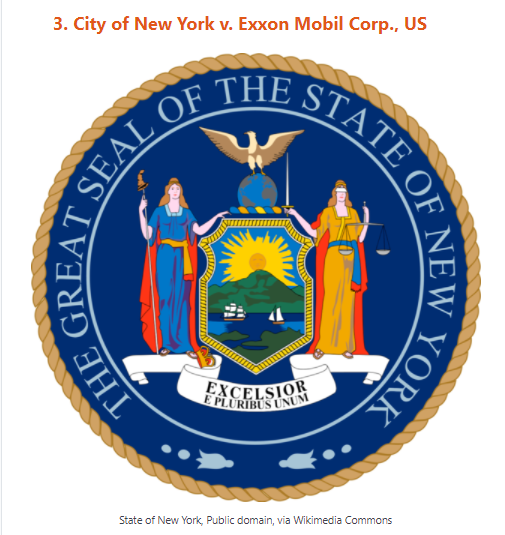
|
Status: Pending Filed: April 2021 Plaintiff: City of New York Defendants: Exxon, BP, Royal Dutch Shell, American Petroleum Institute New York City claimed that oil companies Exxon, BP and Royal Dutch Shell and the American Petroleum Institute had “systematically and intentionally misled consumers” and violated the city’s consumer protection law by misrepresenting the benefits of fossil fuels and exaggerating the companies’ role in fighting climate change. The city argued that the companies’ advertisements describing their products as “cleaner” and “emissions-reducing” failed to make clear their link to greenhouse gas emissions. The city sought penalties starting at $350 for individual infractions. In May 2021, the defendants filed a “notice of removal” to have the case brought to federal court.
|
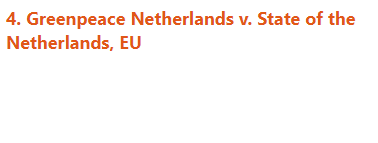
Status: Court rules in favor of defendant
Filed: October 2020
Plaintiff: Greenpeace Netherlands
Defendant: Dutch government
Greenpeace Netherlands filed a lawsuit against the Dutch government over its Covid-19 bailout package to Dutch airline KLM. The environmental group argued that the payout would violate the nation’s duty of care for citizens under Dutch law and contradict Paris Agreement climate goals. Greenpeace sought a court order that would either prohibit the bailout or force KLM to cap its CO2 emissions if it accepted the deal—satisfying Greenpeace’s “no money without green” demand. In December 2020, the Hague District Court rejected the claims, ruling that there is no legal obligation for the state to include climate conditions in its bailout.
Read the full judgement (Dutch)
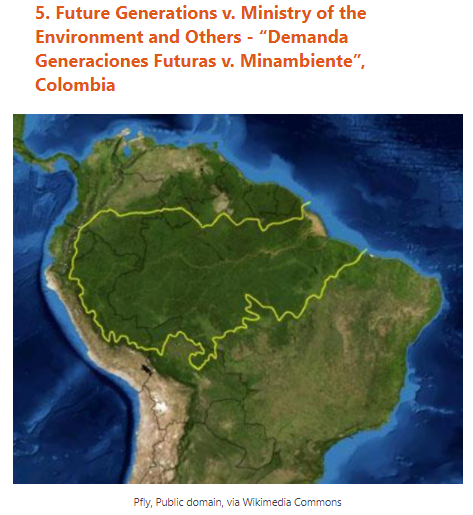
Status: Court rules in favor of plaintiff
Filed: January 2018
Plaintiff: Dejusticia
Defendant: Columbian government
In 2018, the Colombian organization Dejusticia and 25 youths aged 7 to 26 sued the Colombian government, municipalities and companies. They said the government had failed to meet its legal obligation under the Paris Agreement to achieve net-zero deforestation of the Colombian Amazon by 2020, threatening the plaintiffs’ fundamental rights. The plaintiffs’ claims were dismissed by a lower court, but in April 2018, the country’s supreme court reversed this decision, saying that fundamental rights are “substantially linked and determined by the environment and the ecosystem”. The court issued orders to the government to create an action plan tackling deforestation.
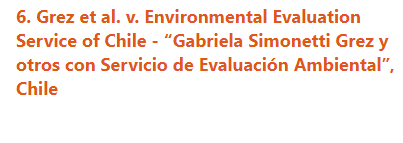
Status: On appeal
Filed: November 2018
Plaintiffs: Gabriela Grez, others
Defendant: Chile’s government
Gabriella Grez and others challenged an environmental impact assessment for a proposed coal blasting project. They said that the government did not consider the climate impacts of coal blasting, in violation of Chile’s commitments to the Paris Agreement. In August 2019, the court said that national commitments to international instruments do not constitute a legal obligation to consider climate change in environmental impact assessments. However, it annulled the impact assessment on other grounds—prompting an appeal.
Read the full judgement (Spanish)

Status: Pending
Filed: April 2021
Plaintiffs: South Durban Community Environmental Alliance, Groundwork
Defendant: Sought African government
Two environmental groups filed a petition to review authorization for a 3000-megawatt gas-fired power plant, claiming that its environmental impact assessment was inadequate. They alleged that the report failed to outline the full-lifecycle emissions from natural gas. The group also claimed that alternative energy, which it called “possible, practical and cost-effective” was not given adequate consideration. It asked South Africa’s high court to reverse the government’s approval for the power plant.

Status: Pending
Filed: 2018
Plaintiff: Association for Protection of Democratic Rights
Defendant: State of West Bengal
Petitioners challenged plans by West Bengal’s government to cut down 150-year-old trees for development projects, arguing their “irreplaceable value”. In 2021, India’s supreme court said there was a need to consider the impact of such projects on carbon sequestration. The court noted India’s commitment to increase tree cover from 23 to 33%. It ordered India to set up an expert committee to develop policy guidelines on the “cutting of trees for developmental projects”.

Status: Court rules in favor of plaintiff
Filed: May 2018
Plaintiff: Friends of Leadbeater’s Possum Inc.
Defendant: VicForests
Plaintiffs sought an order to stop the government-backed logging company VicForests from cutting down trees slated for removal. They claimed that logging would have reduced the habitat of the greater glider—a threatened, tree-dwelling marsupial. The court sided with plaintiffs, ordering the company to stop work and noting that logging and climate impacts were a “major threat” to large, hollow trees that the glider makes its home in.
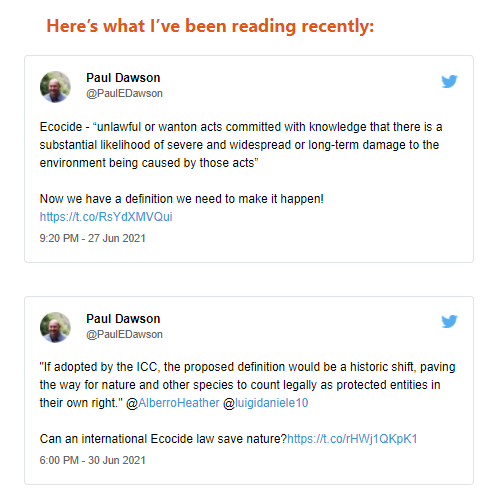
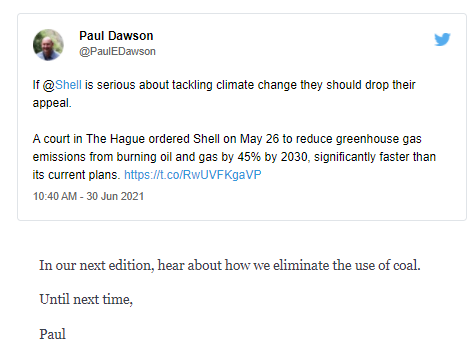
getrevue

